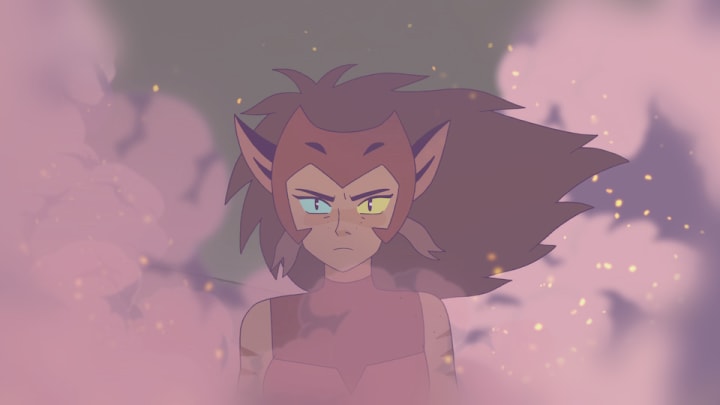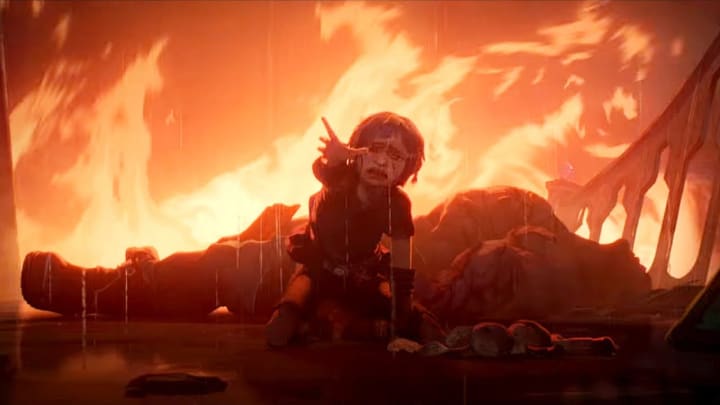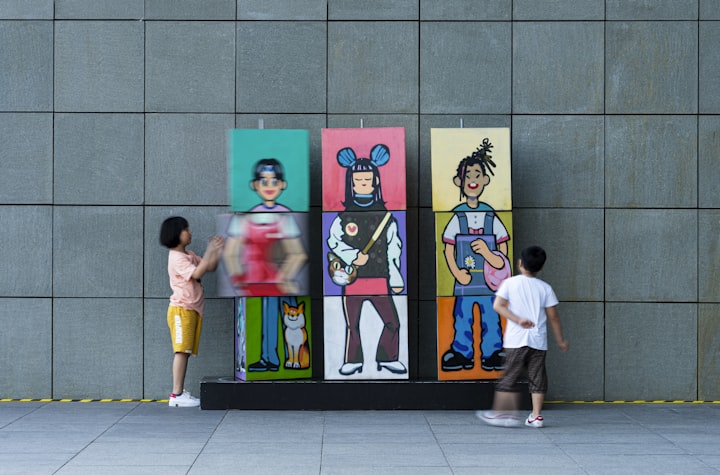
There's been a trend in animated tv shows, lately. More specifically perhaps for female characters, but a trend nonetheless. Although Azula, hailing from Avatar: The Last Airbender and debuting in 2006, the other three villains in this category: Claudia from The Dragon Prince (2018—), Catra from She-Ra: The Princesses of Power (2018—2020), and Jinx from Arcane (2021—) all have one crucial thing in common: abandonment is a core part of their overall character arcs.
Catra and Jinx are perhaps the most similar in this way, so I'll start with Azula and Claudia as another paralleled pair.

Claudia from The Dragon Prince takes three seasons to fully step into her villain role, originating as a goofy if not downright quirky friend to the protagonist pair of princes. A dark mage like her villainous father, Viren, Claudia sees no problem in ripping the magic out of magical creatures and humanoid elves for her own uses, even if her older brother Soren thinks it's creepy and gross.
In season one she's a comedic relief lackey with hints at a dark side, but season two and season three steadily show her descent as she lies in an attempt to kidnap her friends and believes her father's gaslighting of her and her brother. It boils over to a breaking point in late season three, where Soren goes to leave their father as he begins his murderous conquering of the elven lands, and asks Claudia to come with him. She can't, not willing to believe that their family is going to be torn apart... again.
You see, as we find out in late season two, Claudia's parents are divorced, her mother leaving when she was a child and offering each kid a choice of who to stay with. Soren chose their father and Claudia, indecisive, was told to stay with her brother by her mother. Claudia, surprisingly perhaps, doesn't blame her mother for needing to leave. She understands and respects it, stating, "I think she needed to leave for herself, to be happy... somehow." What did traumatize Claudia was the choice, leaving her to feel like inaction was safer. When Soren goes to leave, she states, "Don't do this to me—don't make me choose, not again!"

Soren walks away, leaving Claudia to face the literal monster army her father has created on her own. Claudia ups the villain ante a few episodes later, threatening the life of one of their friends and causing her brother to murder who he believes is their father in self defense. The fallen body turns out to be an illusion, but the abandonment paired with the murder allows Claudia to solidify into the villain she's sure to be in future seasons, now turned against her brother and her former friends.

Azula has a tangentially similar story. Princess of the Fire Nation, Azula also seeks the approval of her much more outright abusive father, Firelord Ozai. Unlike Claudia, Azula and her younger brother Zuko have a terrible relationship, fraught with consistent lying on her part and competition orchestrated by their father. It is easy to think, especially throughout the first two and a half seasons she appears in, that Azula is heartless and doesn't care for anyone.

This is proven untrue when her friends, Mai and Ty Lee, betray her at the Boiling Rock. Mai has chosen to protect Zuko over her own self preservation, and Ty Lee steps in to protect Mai. In one fell swoop, Azula has lost the people she believed she could control more than anyone. And control, for Azula, is synonymous with love.
Their betrayal and her father's dismissal of her, leaving her behind while he moves on to the frontlines himself, leaves her in a spiralling mental state. Although always unhealthy, her paranoia leads to a hallucination of her long gone mother who left to protect Zuko when they were children. Abandoned by everyone, including her own sanity, Azula steps into the finale as the formidable foe she's always been, but undeniably slipping and losing her laser-edge focus.
Like Claudia, her abandonment issues are her undoing.

This is also true for Catra. When her childhood best friend, Adora, discovers the organization that raised them, the Horde, is actually evil, Adora attempts to leave. Like Soren, she offers Catra the chance to come with her. Unlike Claudia, Catra doesn't stay out of desperation or love for a family member, although she and Adora do share a mother figure, Shadow Weaver—who always favoured Adora over her. She stays because she's angry that Adora dare choose something over her, even if it's the suffering of innocent people, and Catra has known the whole time the Horde is evil.
Catra spends the next four seasons punishing Adora for this choice to leave an abusive environment, writing off Adora's trauma as the golden child, clamouring for Shadow Weaver's approval and then her position of power. Catra is driven by spite and anger at her perceived abandonment, in spite of the fact Adora asked her to come and was leaving an abusive environment herself. The idea that Catra been abandoned by Adora never truly leaves her, even as Catra begins her redemption arc in early season five, still saying things such as, "Of course [Adora] left! That's what she does!" in the series finale.
Perhaps most similarly to Catra is Powder (otherwise known as Jinx), who — spoilers for Arcane if you haven't watched it already — was also raised in an extremely volatile environment, rife with violence and abuse. Like Catra, Powder seemingly couldn't do anything right, and depended on her older sister Vi for protection. When things went terribly wrong and one of Powder's inventions exploded as a bomb and killed most of their family, Vi smacked her and walked away in a moment of wrathful grief. When Vi saw her sister possibly in danger, she rushed to protect her, but was dragged back and drugged before she could reach her, leaving Powder to believe she'd been abandoned, and letting Jinx be born.

The main reason I emphasize these perhaps long winded similarities is because: what exactly does the villain with abandonment issues say, precisely, about real life people with abandonment issues? Is it selfish for someone to want someone to stay? In the case of Catra and Powder, both refuse — perhaps forever — to acknowledge that their protector was an equally traumatized child just like them, and take the bitterness to their core. What does this say about scapegoat, golden child dynamics?
Perhaps, the simplest answer is the reason for this trend, that people want sympathetic villains and the abandonment provides both sympathy and vulnerability for them to be influenced by worse forces, shaping them into the bitter villain they will become. As a disclaimer, I am not saying that any of the characters who willingly left — Mai and Ty Lee for Azula as friends; Soren as Claudia's brother and Adora as Catra's childhood friend, leaving an abusive space that wasn't safe for either of them — were wrong in doing so. They absolutely weren't. But doesn't the streak of self preservation speak more to the traditional 'villainy' that we associate selfishness with in the past, than the one who was victim to not having the path forward, or the unwillingness to take it?
I don't pretend to have the answers about any of this. I don't even think the trend is bad — it appears, somehow, to be surprisingly restricted to female villains predominantly in animated or children's shows (although I could have mentioned Simon from Infinity Train, but he deserves a post all his own at a later date). I merely wanted to highlight the rise of the trend in the past few years in particular, and to question the core of the villainy.
Because, for me, the true horror of each villain isn't tragedy amid their circumstances, or even their sadness and bitterness at a real or perceived abandonment. It's their refusal to ever see past their own pain that causes them to hurt the people they loved the most, because they would rather sever than be severed. It's a viciously protective instinct that perpetuates most cycles of abuse in this world, a fear that others will not look out for us even if we look out for them, and a refusal to broaden one's horizons to other's pain. The fear that underlies each of them, that they aren't enough as they are, and either need someone who can miraculously avoid death or morals in order to literally stay with them, always, or that they need no one at all.
I would love to see a hero with abandonment issues in more shows in the future, both animated and live action. I would love to see the flip-side manifestation of not blame, but a visceral fear that someone is wrong with them for being left, not on their siblings or friends for leaving an environment they refuse to. Again, some of this applies more to a couple of the women on the list above than others (largely Jinx, who was the youngest of them all and the least spite motivated by far, next to Claudia) but I think the point is apt nonetheless.
Wanting someone to stay is not selfish, but refusing to see why they can't — or couldn't, through no fault of their own — is.
About the Creator
TC13
Aspiring author and mythology enthusiast with a deep love for fantasy. Writes from a queer nb (they/them) perspective.






Comments
There are no comments for this story
Be the first to respond and start the conversation.